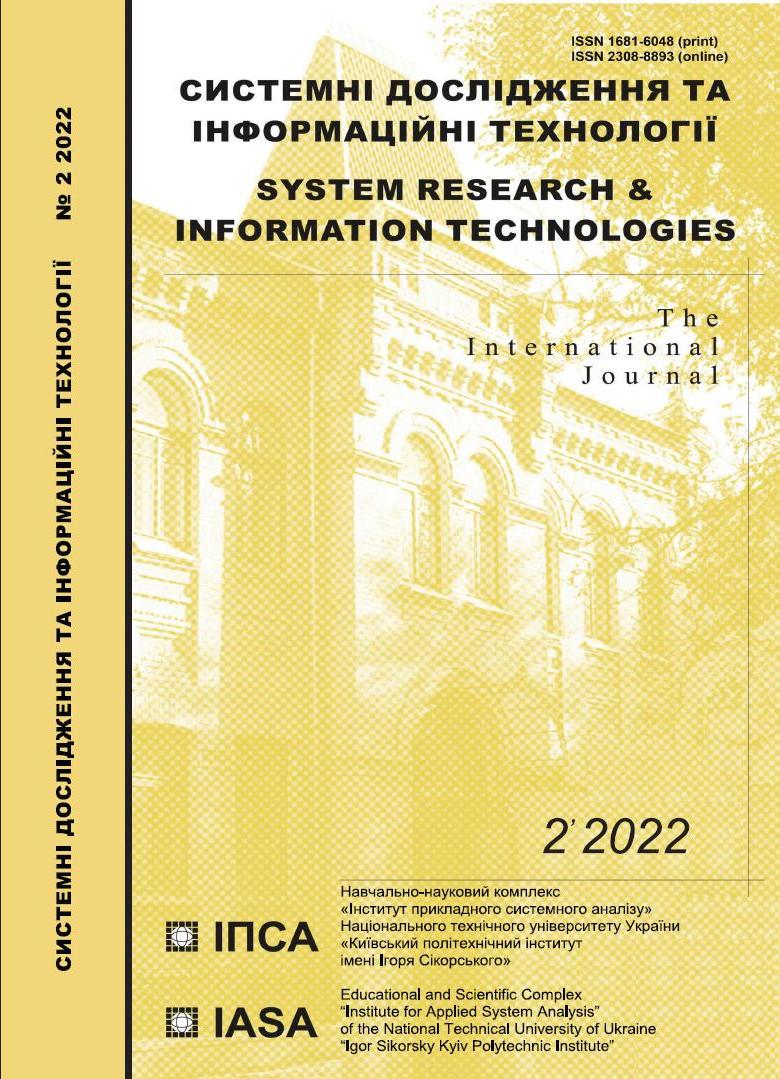Intelligent decision support systems in the development of megalopolis infrastructure
DOI:
https://doi.org/10.20535/SRIT.2308-8893.2022.2.04Keywords:
megapolis, infrastructure entities, intelligent decision support system, linguo-numerical evaluation of alternatives, fuzzy situational algorithmAbstract
From the point of view of the management theory, a megapolis is a complex non-stationary spatial system. The problem of making innovative decisions on the development of their infrastructure is caused by the presence of a large amount of information, its uncertainty and inconsistency. This article discusses the principles of building intelligent decision support systems of a situational type for the innovative development of the infrastructure of megacities. Solutions are formed by logico-analytical processing of data on the situation in general and special cases of situations for the considered subject of the megalopolis infrastructure. For the practical implementation of the decision-making mechanism, the article proposes a linguistic-numerical method for determining the potentially best alternative and a fuzzy situational algorithm for managing the subjects of the megalopolis infrastructure, based on the structural generality of the situations of a fuzzy situational network. The obtained results were tested on two real infrastructure subjects of Kyiv.
References
V. Bourdakis, “Low Tech Approach to 3D Urban Modeling”, Architecture in Computro (26th eCAADe Conference Proceedings), Antwerpen, Belgium, 2008, pp. 959–964.
A.A. Sholomitsky, A.A. Lunev, and O.M. Tarasova, “Technology of three-dimensional modeling of cities”, Scientific Bulletin of the Nizhny Novgorod State University, Nizhny Novgorod, no. 2, pp. 57–62, 2011.
M. Carrozzino, F. Tecchia, and M. Bergamasco, Urban procedural modeling for real-time rendering. Available: http://www.isprs.org /proceedings/XXXVIII/5-W1/pdf/carrozzino_etal_2.pdf
V.P. Osipov, T.V. Sivakova, V.A. Sudakov, and Yu.I. Nechaev, “Intellectual core of the decision support system”, Preprints of the IPM named after M.V. Keldysh, no. 205, 23 p., 2018. doi: 10.20948/prepr-2018-205.
V.P. Karelin, “Intellectual technologies and artificial intelligence systems for decision support”, Bulletin of the Taganrog Institute of Management and Economics, no. 2, pp. 79–84, 2011.
E.A. Engel, “Models and methods of intellectual support for manager decision making”, Journal of Siberian state University of science and technology, no. 4, pp. 106–112, 2011.
O. Tikhanychev, “About information support of decision-making support”, International Journal “Software Products and Systems”, vol. 27, pp. 311–315, 2018. doi: 10.15827/0236-235X.122.311-315
R. Bavad and Jean-Charles Pomerol, “An “Intelligent” DSS for the Reinforcement of Urban Electrical Power Networks”, Conference: Decision Support Systems: Experiences and Expectations, Proceedings of the IFIP TC8/WG8.3 Working Conference on Decision Support Systems: Experiences and Expectations, Fontainebleau, France, 30 June – 3 July 1992, pp. 153–165.
G. Phillips-Wren, “Decision Support Systems”, in book: Multicriteria Decision Aid and Artificial Intelligence. Loyola University Maryland, 2013, pp. 25–44. doi: 10.1002/9781118522516.ch2.
A. Kaklauskas, “Intelligent Decision Support Systems. In book: Biometric and Intelligent Decision Making Support”, Intelligent Systems Reference Library. Vilnius Gediminas Technical University, 2015, pp. 31–85. DOI: 10.1007/978-3-319-13659-2_2.
V.P., Karelin and O.L. Kuzmenko, “Choosing the best management solution with fuzzy source data and multiple criteria”, Izvestiya VUZov. The North Caucasus region. Technical sciences, no.1, pp. 158–165, 2006.
A.A. Evseeva, D.A. Krasnikova, and A.A. Kazakov, “Modern approaches to solving multi-criteria problems”, Scientific and methodological electronic Journal “Concept”, vol. 3, pp. 2801–2805, 2013. Available: http://e-koncept.ru/2013/53563.htm.
A. Stenin, I. Drozdovych, and M. Soldatova, “Situational management of urban engineering networks with intelligent support for dispatching decisions”, Proceedings of the Third International Workshop on Computer Modeling and Intelligent Systems (CMIS-2020) Zaporizhzhia, Ukraine, April 27 – May 1, 2020, pp. 118–131. Available: http://ceur-ws.org/Vol-2608
M.L. Minsky, “A Framework for Representing Knowledge”, in Patrick Henry Winston (ed.), The Psychology of Computer Vision. New York: McGraw-Hill, 1975, pp. 211–277.
M.K. Hasan, “A Framework for Intelligent Decision Support System for Traffic Congestion Management System”, Engineering, Kuwait University, vol. 2, pp. 270–289, 2010. doi: 10.4236/eng.2010.24037
A.A. Akhrem, M.R. Ashinyants, and S.A. Petrov, “Fuzzy logical conclusion in the decision-making system”, Proceedings of the Institute of System Analysis of the Russian Academy of Sciences, vol. 29, pp. 265–275, 2007.
A. Stenin, O.I. Lisovichenko, I.G. Drozdovich, and S.A. Stenin, “Analysis of passenger traffic and situational management of urban transport”, Bulgarian Journal for Engineering Design, no. 40, pp.7–12, 2019.
O.M. Trofymchuk and P.I. Bidyuk, Decision support systems, modeling, forecasting, risk Estimation. LAP LAMBERT Academic Publishing, 2019, 179 p.

